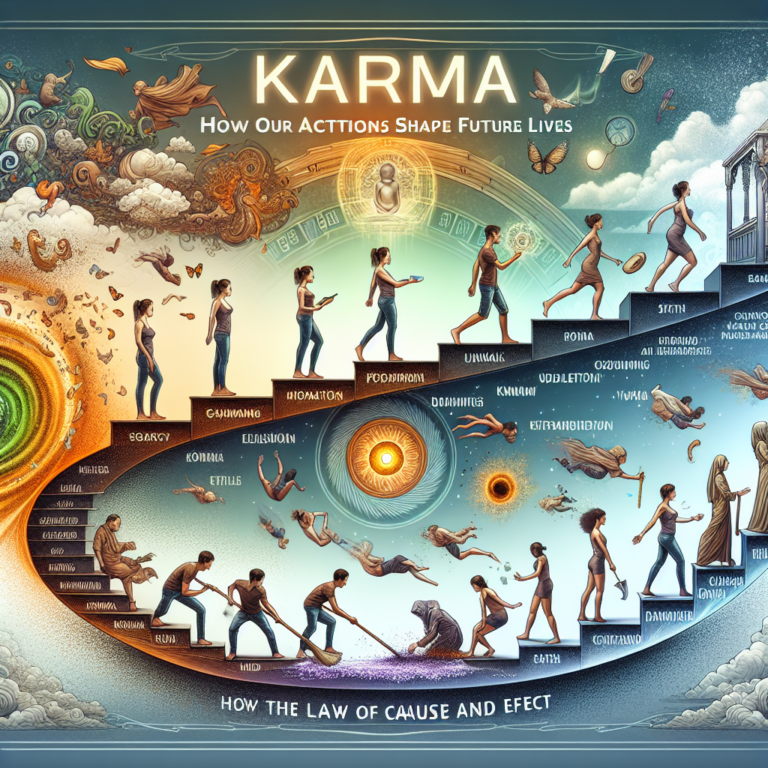The Interplay of Karma and Forgiveness: How Letting Go Can Transform Your Life
In the complex tapestry of human existence, the concepts of karma and forgiveness dance a delicate interplay, inviting us to explore the depths of our actions and the profound relief that comes from letting go. These two forces shape our emotional landscapes and influence the relationships we cultivate with ourselves and others. Understanding karma and forgiveness can lead to transformative experiences that enhance our well-being and promote a more harmonious existence.
Understanding Karma
At its core, karma is a principle often associated with Eastern philosophies, particularly Buddhism and Hinduism. It encapsulates the idea that every action has consequences. These consequences can unfold in this life or future lives, influencing our experiences and shaping our paths. Karma functions on both micro and macro levels, affecting our personal relationships, emotional state, and overarching life circumstances.
In essence, karma encourages us to be mindful of our actions, promoting a deep sense of responsibility. Each act—whether it’s an unkind word, a generous gesture, or even a thought—contributes to the energy we send into the world. This cycle of cause and effect invites us to reflect on how we treat others and ourselves and the lasting imprint our actions leave.
The Role of Forgiveness
Forgiveness, on the other hand, is a powerful emotional and psychological process that allows individuals to release feelings of resentment or vengeance towards others (or themselves) following a perceived wrong. Forgiveness does not imply condoning the behavior that caused the hurt; instead, it is about liberation from the emotional chains of anger and bitterness.
For many, forgiveness can be a challenging journey. Grievances may feel monumental, but releasing them can lead to newfound freedom. It involves a radical shift in perspective, one that prioritizes healing over retaliation. In this light, forgiveness is not merely a gift to others but also a profound act of self-care.
The Interplay of Karma and Forgiveness
The interplay between karma and forgiveness creates a powerful dynamic in our lives. Letting go of grudges and embracing forgiveness can deeply influence our karmic path. When we hold onto negative feelings, we effectively perpetuate the karmic cycle of suffering. We may find ourselves trapped in a loop of revenge, anger, and resentment, which only creates more negative karma.
Conversely, choosing to forgive can break this cycle. It allows us to release the burdens of past grievances and redirect our energy toward positive action. By forgiving, we can soften the sting of past events, fostering healing that impacts not only ourselves but also those around us. In this way, forgiveness acts as an antidote to negative karma, producing ripples of goodwill and compassion.
The Transformative Power of Letting Go
Letting go is an essential component of both forgiveness and the alleviation of karmic consequences. When we choose to release negative emotions, we allow space for positive experiences and growth. Here are some key transformations that letting go can facilitate:
Emotional Liberation: Holding onto grudges weighs heavily on our hearts and minds. When we let go, we free ourselves from the emotional burden, leading to improved mental health and well-being.
Health Benefits: Studies have shown that forgiveness can reduce stress, lower blood pressure, and contribute to overall physical health. By letting go of negativity, we open ourselves to a healthier lifestyle.
Improved Relationships: Forgiveness can mend relationships, fostering deeper connections and rebuilding trust. Letting go of past hurts enhances our ability to engage with others from a space of love and understanding.
Personal Growth: The journey of forgiveness challenges us to confront our own flaws and limitations. It encourages self-reflection, prompting us to cultivate empathy, compassion, and a deeper understanding of others.
- Positive Karmic Seeds: When we forgive, we plant seeds of positive karma. Our actions can inspire others to forgive as well, creating a chain reaction of kindness and healing that reverberates through our communities.
Practicing Forgiveness
Given the profound impacts of forgiveness, how can one cultivate this practice? Here are some suggestions:
Acknowledge Your Feelings: Allow yourself to feel the pain and hurt associated with the grievance. Recognizing these feelings is the first step toward letting go.
Reflect on the Situation: Understand the perspective of the person who hurt you. This doesn’t mean justifying their actions, but recognizing that everyone has their struggles can foster empathy.
Express Forgiveness: This might be a personal act, or it could involve communicating with the person you’re forgiving. Writing a letter, even if you don’t send it, can be cathartic.
Reframe Your Story: Instead of seeing yourself as a victim, change the narrative. Focus on your growth and the lessons learned.
Practice Mindfulness: Engaging in mindfulness practices can help cultivate a sense of peace and presence, making it easier to let go of negative emotions.
- Seek Professional Help: If forgiveness feels overwhelming, don’t hesitate to seek support from a therapist or counselor who can guide you through the process.
Conclusion
The interplay of karma and forgiveness serves as a guiding light toward a more fulfilling existence. By understanding the implications of our actions and embracing the transformative power of letting go, we open ourselves to healing and growth. This journey is not always easy, but it is undoubtedly worth it. Each step towards forgiveness nurtures positive karmic energy, enriching our lives and the lives of those around us.
FAQs
1. Is karma only about punishment?
No, karma is not solely about punishment. It refers to the principle of cause and effect. Positive actions can lead to positive outcomes, while negative actions may result in negative experiences. It’s a holistic view of life, emphasizing the importance of our intentions and actions.
2. Can I forgive someone and still feel hurt by their actions?
Absolutely. Forgiveness is not about erasing the hurt; it’s about choosing to release the grip that pain has on you. It’s possible to forgive while still acknowledging the emotional impact of the situation.
3. How can I start my journey toward forgiveness?
Start by acknowledging your feelings and reflecting on what you want to let go of. Consider practicing mindfulness or writing down your thoughts. Take small steps, be patient with yourself, and remember that forgiveness is a process.
4. Does forgiving someone mean I have to reconcile with them?
No, forgiveness does not necessitate reconciliation. You can forgive someone for your peace of mind without having to re-establish a relationship. The primary focus of forgiveness is your emotional liberation.
5. How does letting go affect my karma?
Letting go of grudges and negative feelings can foster positive karmic outcomes. When you release harmful emotions, you create space for compassion, kindness, and positive actions—thereby influencing your karma in a constructive way.
It seems like you’re looking for a prompt, but I need a bit more context to better assist you. Are you looking for writing prompts, discussion topics, creative ideas, or something else? Let me know your interests or any specific themes you have in mind!, #Interplay #Karma #Forgiveness #Letting #Transform #Life, #Interplay #Karma #Forgiveness #Letting #Transform #Life, 1735611010, the-interplay-of-karma-and-forgiveness-how-letting-go-can-transform-your-life





